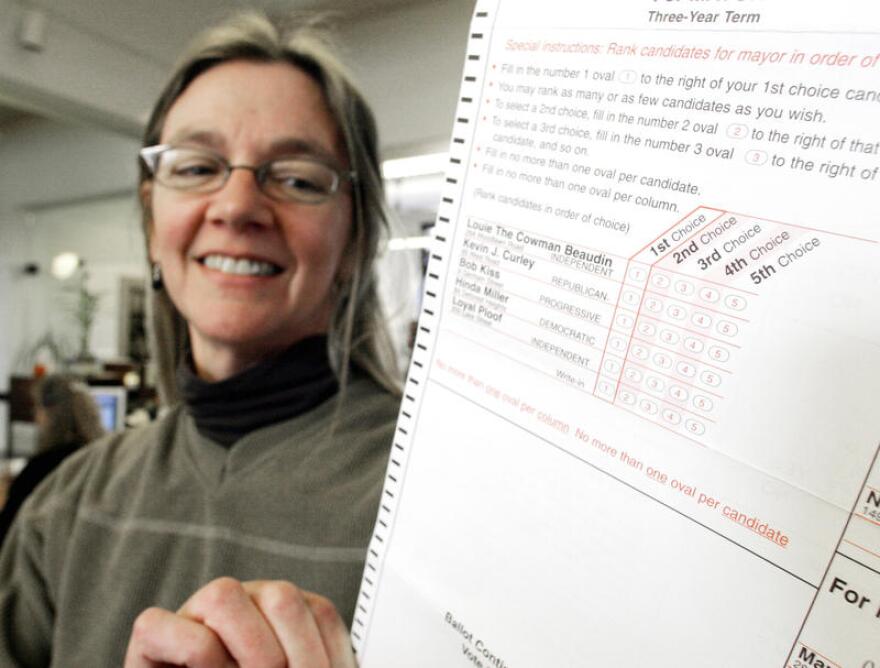The Maine Supreme Judicial Court says the nation’s first statewide ranked-choice voting election can go forward in the June primaries.
The court’s opinion closes — at least for now — an ongoing legal dispute over Maine election officials’ ability to implement the law for the primary elections, which will determine party candidates for governor and a high-profile 2nd Congressional District race. It also effectively ratifies a previous ruling by a Maine Superior Court judge that the system can be used in June.
The court’s opinion is a blow to opponents of ranked-choice voting, which have sought to block the law and eventually repeal it. Last week, in a largely party-line vote, the Republican-controlled Maine Senate passed an order that allowed the Senate to sue the secretary of state, whose office oversees Maine elections.
Attorneys for the Senate argued that the secretary of state’s office doesn’t have the authority to spend money to implement the law because the Legislature has never authorized it to do so. The Senate also questioned whether election officials can legally seize ballots if a ranked-choice election moves into runoff tabulation phase.
But Maine’s law court says ranked-choice voting is the law for the June primaries. The court also said that it won’t intervene in the administrative and funding decisions by state election officials.
“The consistent and explicit purpose of the citizens’ initiative and the people’s veto has been to transition Maine elections to a system of ranked-choice voting,” the seven justices wrote in their unanimous opinion.
The opinion was hailed by advocates for ranked-choice voting, who have been battling legislative and legal efforts to defeat the law voters approved in 2016.
“The Maine Legislature has changed or repealed all four of the initiatives passed by Maine voters in 2016. Today’s decision by the Maine Supreme Court confirms that the Maine people are sovereign and have the final say,” said Kyle Bailey, campaign manager for the Committee for Ranked Choice Voting, in a statement.
Senate President Michael Thibodeau said in a statement that court’s opinion made it clear that ranked choice will be used in the primary. But he said the court also avoided several outstanding constitutional concerns.
“From the beginning, our primary concern has been the integrity of Maine’s voting system, and we remain concerned about the citizens of Maine having confidence in it,” he said. “In the short amount of time we have left in the legislative session, we will consider what we can do to ensure the election process goes smoothly on June 12th.”
The Legislature is scheduled to adjourn Wednesday, but it could vote to extend the session.
The court’s opinion may halt efforts to prevent ranked choice from being used in the June primaries, but the legal battles may not be over. Several Republican gubernatorial candidates have said they may challenge the results of the primary elections if ranked choice is used.
Tuesday’s opinion followed oral arguments held by the court last week. During the 35-minute hearing, nearly all seven of the justices appeared skeptical of the Senate Republicans’ arguments.
The court’s opinion means that Mainers will be using ranked-choice voting at the same time that they’ll be deciding if they want to keep for future election contests.
In October, the Legislature passed a law that repeals the law by 2021 if a constitutional amendment isn’t passed to allow the system to be used in all statewide contests. The law was in response to a law court opinion last year that the election system may violate the Maine Constitution if used for gubernatorial and legislative elections. The opinion was silent on its use in other contests, including primary elections.
Advocates for ranked-choice voting then organized a people’s veto of the repeal law, which will appear on the June 12 ballot — at the same time that Mainers are using the system for the first time.
Nearly 400,000 Maine voters approved ranked choice in 2016. Numerous bills to put the system in place have been defeated over the past decade as many Democrats and Republicans fear that it will erode the influence of their parties while disrupting a plurality election system that both parties have used with success.
The Maine Democratic Party endorsed the system as part of its 2016 party platform, a move often attributed to concerns that its candidates have been hampered in statewide races when there’s more than two candidates in a race.
Under Maine’s plurality voting system, candidates who get the highest vote totals are declared winners.
Under ranked choice, voters rank candidates in order of preference. If no one had more than 50 percent of the vote after the first count, the candidate with the fewest votes is eliminated, but voters who chose that candidate have have their ballots added to the totals of their second-ranked candidates. The ballots are then retabulated until one candidate had a clear majority and is declared the winner.




